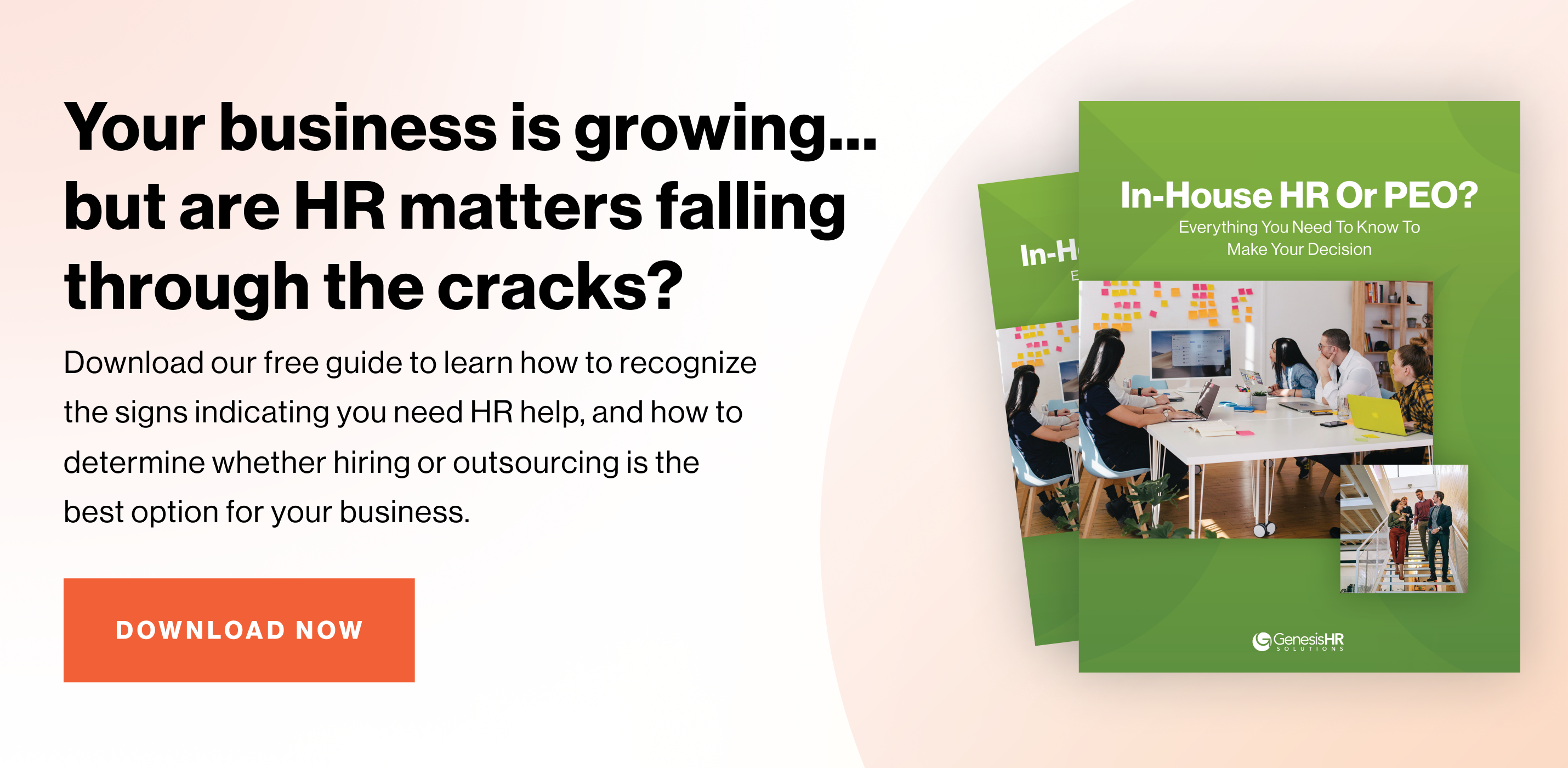When it comes to HR support for small businesses, there is a lot more to consider than just creating a safe and happy workplace for your employees. Of course, you want to build an environment where your employees enjoy coming to work, but the HR world is a little more complex than that. There are strict rules and best practices involved in setting up a proper HR solution for your business.
There are companies (like PEOs) that can help you handle all those nuances, and here are the services they provide you might want to take advantage of. From learning the right way to do payroll to developing competitive employee benefits, you’ll be well on your way to understanding some of the crucial ins and outs of HR.
HR Services For Small Businesses: A Checklist
Employment Law Guidance
A crucial HR tip for small businesses: If you don’t understand employment law, seek the help of someone who does. Regulations cover nearly every aspect of hiring, paying, retaining, and terminating employees, including factors such as compensation, benefits, and safety. It is crucial to understand these laws, because ignorance is not an excuse, and you can be fined, your business can suffer consequences, or you may even face jail time if you are found to be breaking the law. To start familiarizing yourself with employment law, read the Federal Employment Law Handbook and consider hiring an employment attorney.
Payroll
Mismanaging payroll is a fast track to losing your employees’ trust. Every paycheck must be correct. Paying them on time is critical, too. Set a strict payment schedule and stick to it. Also, make sure you are compliant with the rules around correctly classifying your employees—such as exempt or nonexempt—and paying them based on their appropriate classifications.
Mismanaging payroll is a fast track to losing your employees’ trust. Every paycheck must be correct. Paying them on time is critical. Click To TweetEmployee Documentation
What kind of information belongs in an employee file and how do you keep it confidential? Yes, there are rules for that, too. Learn how to document your employees, but also how to properly maintain and secure their files. This kind of documentation is crucial in the event a situation with an employee arises.
Hiring & Retention Help
Everyone wants to become an employer of choice, but you have to earn that title first. Focus on what matters most to your employees, such as compensation and opportunities to move up. Develop competitive compensation and an attractive benefits package. Then work on creating a positive and supportive culture, where your employees can grow and advance their careers. Build it and they will come (and stay!).
Employee Handbook Development
Every business needs an employee handbook. Consider it your safeguard in case of any disputes. In the manual, outline your employee expectations and your company’s operating procedures. Require every employee to sign it at the time of hire and once again each year following. It’s also good HR practice to review and revise your handbook at least once a year.
Make sure your organization has an employee handbook that thoroughly addresses the processes and activities of your employees.
Get started with this free template.
Performance Management Oversight
Performance management involves providing your employees with a clear path toward success, by developing personal and company goals that they can work toward. Equally as important is providing constructive written feedback on individual performance. It’s a solid tactic for retaining your staff because when you recognize and reward your employees, they feel more valued. Alternatively, it can also help weed out underperformers within your company.
Benefits Selection Assistance
Benefits packages are not one-size-fits-all. The more you know and understand your employees, the better you can meet their needs. Generous packages include competitive (and affordable) health insurance plans, along with other necessities like paid time off and retirement saving programs. A strong package will add value to your employees’ overall compensation.
Networking
You’re not the only one navigating the HR scene. Join a professional organization or chamber of commerce to network with other small business owners. When you create a community, you can share your experiences and learn from each other’s successes and mistakes.
Compliance
Compliance is complicated, especially if you are a multi-state employer. Staying on top of the ever-changing climate can help protect you and your business, and even though it is a time-consuming task, it is absolutely necessary.
HR Strategy Development
It’s crucial to create your business goals before beginning the hiring process, as opposed to hiring and then creating your goals around your current staff. Once you can articulate your goals, you can better analyze your current resources and plan for the future. And this is just one step in the HR planning process—check this article to get the full scoop.
Benefits Administration.
Employee benefits are costly for both you and your employees. So it’s important to make sure your staff is actually satisfied with their benefits and feel taken care of. Trying to do this on your own can be a challenge. For example, who will employees contact if they have a problem with a claim—you, the carrier, or someone else? Imagine the frustration of having to chase down answers regarding a major life event and being led in circles because there’s no point person managing benefits administration. This situation could sour an employee’s view of their benefits, no matter how good the offerings are.
With a PEO, this changes completely. By acting as the bridge between your employees and their benefits, your PEO helps resolve issues quickly and effectively, ultimately improving your employees’ satisfaction. Helping them take care of important benefits-related issues keeps them focused on their job and staying productive.
Employee Benefits Education
Benefits are complicated. Everything from procuring and explaining them, to renewing and negotiating them is time-consuming. On top of that, you have the different types of health insurance, high-deductible plans, access to HSAs and FSAs, rules and regulations governing benefits, and other options and add-ons.
Educating your employees around their benefits helps them proactively make good choices. As the employer, this shows you value and invest in your employees. Not only do you offer comprehensive benefits but you also help them see the value in it—what it all means and how benefits can and should be used.
Navigating Annual Renewal
Small business owners must know their options for renewing their insurance and other benefits plans. This is unquestionably easier with a PEO. With a PEO partnership, you can participate under a PEO-sponsored plan or a client-sponsored plan. Your PEO helps you navigate that through renewal time; the PEO can also manage the client-sponsored plans.
401(k) Offerings
On their own, small businesses with fewer than 100 employees are not required to have an audit on their 401(k) plans. But what if there are mistakes, even unintentional ones? If they’re not caught, it could be harmful to your business. Multi-employer plans, like those offered through a PEO, are required to undergo an audit. When small businesses partner with a PEO and participate in their retirement plan, they benefit (and have peace of mind) because they belong to a group that is large enough to require an annual audit, and share in the fiduciary responsibilities.
A Trusted Partner In These—And Other—HR Services
These HR services for small businesses and midsize businesses are just an introduction of what you may be looking for as an employer to navigate the many moving parts in the world of human resources. If you’re feeling overwhelmed as you read it, that’s actually a good thing—it shows you are paying attention to everything you should be doing! As one of the leading HR firms for small businesses in New England, GenesisHR is a PEO that will not only save time and money that you would otherwise spend on developing an internal HR department, but will help you feel assured you’re covered in the area of compliance as well.
Contact us today to find out how we can help manage your HR needs.





